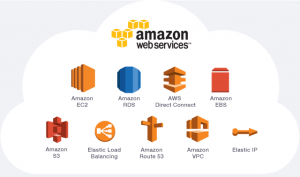What is Cloud Computing?
Cloud computing is the on-demand delivery of computer services, such as storage, servers, databases, networking, software, intelligence, analytics, and moreover the internet with pay-as-you-go pricing. Instead of buying, maintaining, and owning physical data centers and servers, one can access IT resources and pay only for the services in use with the help of cloud computing. Cloud computing offers lower operating costs, flexible resources, foster innovation, and economies of scale.

Why Choose AWS Cloud Computing?
In 2006, Amazon Web Services (AWS) began to offer IT infrastructure services to companies and businesses like web services globally known as cloud computing. AWS is the most adopted and comprehensive cloud platform that offers more than 200 fully-featured sets of global cloud-based services. Some of the cloud-based products provided by AWS include compute, storage, databases, networking, developer tools, management tools, security, IoT, analytics, and enterprise applications: with pay-as-you-go pricing and on-demand services in seconds. AWS provides a highly scalable, reliable, and low-cost infrastructure platform in the cloud that powers thousands of businesses worldwide. AWS provides a platform for businesses to develop applications using the programming language of their choice with the help of familiar tools.

Some of the most common services offered by Amazon Web Services are:
- Amazon Elastic Compute Cloud (EC2),
- Amazon Simple Storage Service (S3),
- Amazon Relational Database Service (RDS),
- Amazon Virtual Private Cloud (VPC),
- Elastic Load Balancing (ELB) or Application Load Balancing (ALB),
- AWS Direct Connect, and more.
Advantages of Using AWS Cloud Computing
Some of the advantages offered by Amazon Web Services (AWS) are as follows:
- Variable Expense: Instead of investing in physical data centers and services before the knowledge of its use, one can always pay for resources they require and use on the go with the help of AWS.
- Speed and agility: In AWS, the addition of new IT resources are only a click away which helps to reduce the time required to take those resources online from weeks to minutes. AWS helps to dramatically increase an organization’s agility by reducing the time and cost as the time and cost required to experiment and__ develop different resources are significantly lower.
- Take websites global in minutes: AWS helps to quickly deploy applications in multiple locations around the world within a click. This allows businesses to provide lower latency, high throughput, and better customer experience at minimal costs. AWS offers more than eighty availability zones within the 25 geographic regions around the world. AWS has also announced plans for 21 more Availability Zones and seven more AWS regions in India, Australia, Israel, Switzerland, Indonesia, Spain, and UAE (United Arab Emirates).

- Focus on business and not infrastructure: AWS helps businesses to focus on their customers rather than on the heavy lifting of stacking, racking, and powering traditional data centers and servers.
- Eliminate guessing the infrastructure capacity needs: While using a traditional database, one has to make capacity decisions prior to deploying an application, whereas, with the help of AWS, one can access as little or as much as the capacity required. AWS also helps businesses to scale up or down their resources as required within a few minutes.
Benefits of using Amazon Web Services (AWS)
Security
The AWS infrastructure is monitored 24/7 to ensure the integrity, availability, and confidentiality of the data. All data flowing across the global network of AWS interconnecting data centers, availability zones, and regions are encrypted at the physical layer before it leaves the secured network automatically. Use AWS, developers have the ability to control data, including encrypting, managing, and moving data retention at any time.
Availability
In comparison with other cloud providers, AWS delivers the highest network availability. AWS provides isolated regions and is also comprised of multiple availability zones. With the help of AWS, one can also partition applications across multiple availability zones in the same region to ensure high availability. In addition to that, AWS also offers regional API endpoints that are designed to operate securely for at least 24 hours when isolated from the global control plane functions.
Flexibility
AWS provides the flexibility of choosing where and how to run the workloads even while using the same control plane, network, API’s, and AWS resources. In order to run any application globally, one can choose from any of the available AWS regions and zones. Developers can also choose AWS Wavelength or AWS Local Zones in order to run their applications with single-digit millisecond latency. Developers can also choose AWS Outposts if they want to run on-premise applications.
Scalability
The AWS Global Infrastructure enables businesses to take advantage of the theoretically infinite scalability of the cloud. While using traditional data centers and services, customers used to over-provision resources to ensure that enough capacity to run the business operations during time is available. Whereas, while using AWS, they need to provision only the required amount of resources, knowing they can instantly scale down or up resources along with the business needs. This feature helps businesses to reduce costs and improves customer satisfaction.









